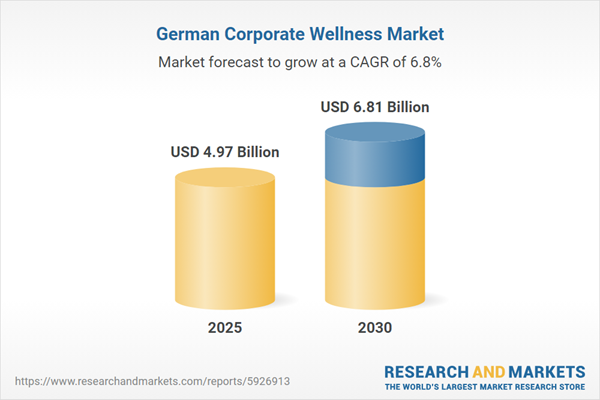Corporate wellness is a type of activity or program that the organization designs to support and encourage healthy behavior and overall employee well-being in the workplace. Multiple factors are estimated to cause or increase the mental stress of an employee, which include longer working hours, heavy workload, changes in organizational settings, and job insecurity.
Germany has a well-established corporate culture that aims to foster the employee skills in new directions that improve the overall corporate productivity. The country has initiated well-designedcorporate wellnesspolicy aiming to create a safer and fun working environment for the employee, which helps to combat increasing stress. Hence, such corporate wellness program also helps in enhancing the productivity of the employees while simultaneously providing autonomy to them.
Germany Corporate Wellness Market Drivers
Rising healthcare expenditures is expected to propel the market expansion
The constant workload and pressure to meet deadline leads to an employee's health deterioration owing to which the overall job productivity, motivation and performance is also impacted. Hence, to tackle such growing stress time-to-time health checkups and clinics visits have increased in Germany thereby propelling the overall healthcare expenditure in the country.For instance, the Statistisches Bundesamt (Destatis), in its report, stated that the total healthcare expenditure in Germany was recorded at EUR 440.8 billion in 2021, which increased to EUR 475 billion in 2022. In 2023, the total healthcare expenditure in the nation was recorded at EUR 497.7 billion.
Reasons for buying this report:
- Insightful Analysis: Gain detailed market insights covering major as well as emerging geographical regions, focusing on customer segments, government policies and socio-economic factors, consumer preferences, industry verticals, other sub-segments.
- Competitive Landscape: Understand the strategic maneuvers employed by key players globally to understand possible market penetration with the correct strategy.
- Market Drivers & Future Trends: Explore the dynamic factors and pivotal market trends and how they will shape up future market developments.
- Actionable Recommendations: Utilize the insights to exercise strategic decision to uncover new business streams and revenues in a dynamic environment.
- Caters to a Wide Audience: Beneficial and cost-effective for startups, research institutions, consultants, SMEs, and large enterprises.
What do businesses use our reports for?
Industry and Market Insights, Opportunity Assessment, Product Demand Forecasting, Market Entry Strategy, Geographical Expansion, Capital Investment Decisions, Regulatory Framework & Implications, New Product Development, Competitive IntelligenceReport Coverage:
- Historical data & forecasts from 2022 to 2030
- Growth Opportunities, Challenges, Supply Chain Outlook, Regulatory Framework, Customer Behaviour, and Trend Analysis
- Competitive Positioning, Strategies, and Market Share Analysis
- Revenue Growth and Forecast Assessment of segments and regions including countries
- Company Profiling (Strategies, Products, Financial Information, and Key Developments among others)
Germany Corporate Wellness Market is analyzed into following segments follows:
By Type
- Weight Management & Fitness
- Smoking Cessation
- Stress Management
- Others
By Enterprise Size
- Small
- Medium
- Large
By Delivery Model
- On-Site
- Off-Site
By State
- North Rhine-Westphalia
- Bavaria
- Baden-Württemberg
- Lower Saxony
- Hesse
- Others
Table of Contents
Companies Mentioned
- DB Fitness
- Health Atoms
- Machtfit GmbH
- Urban Sports GmbH
- Workplace Options
- ComPsych Corporation
- EGYM Wellpass
- Moveeffect
- Kyan Health AG
- Champion Health GmbH
Table Information
| Report Attribute | Details |
|---|---|
| No. of Pages | 78 |
| Published | December 2024 |
| Forecast Period | 2025 - 2030 |
| Estimated Market Value ( USD | $ 4.97 Billion |
| Forecasted Market Value ( USD | $ 6.81 Billion |
| Compound Annual Growth Rate | 6.8% |
| Regions Covered | Germany |
| No. of Companies Mentioned | 10 |









